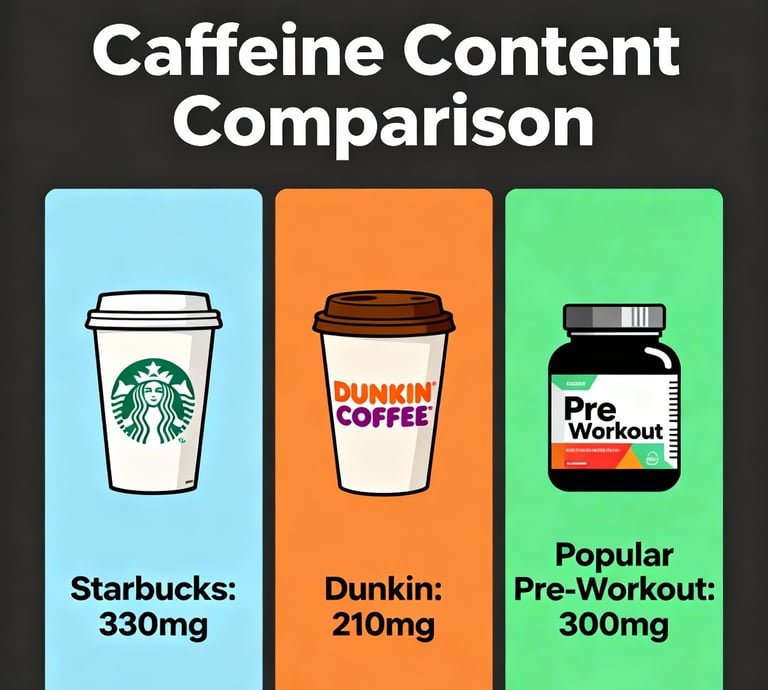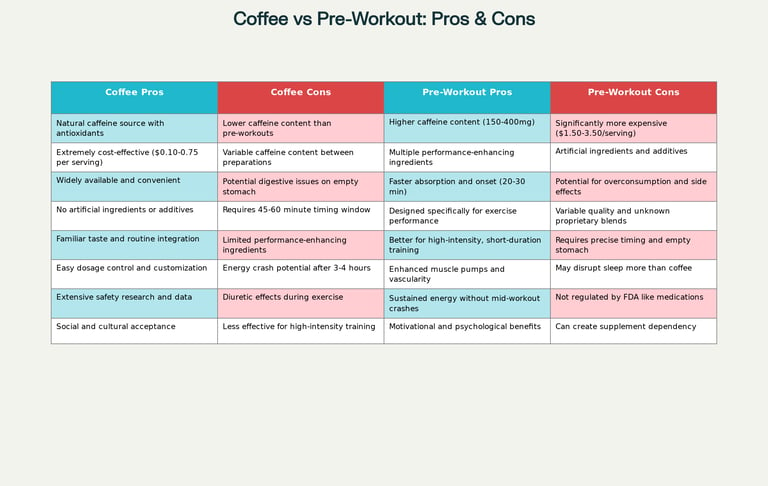Pre-Workout vs Coffee: What American Athletes Actually Use
Pre-workout vs coffee for American athletes: full Comparison of caffeine content, costs, performance benefits, timing, and what top athletes actually use daily.
HYDRATION GUIDEHEALTH TIPS


When American athletes need energy for their workouts, they face a choice that's become as common as deciding between Starbucks and Dunkin': should they fuel up with coffee or reach for a pre-workout supplement? While 66% of Americans drink coffee daily and the pre-workout supplement market has exploded to over $13 billion, the debate continues in gyms nationwide. From college athletes to weekend warriors, the caffeine conversation reveals fascinating insights about American fitness culture, performance optimization, and the surprising science behind what actually works
The Great American Caffeine Divide
Coffee Culture Meets Gym Culture
America's relationship with caffeine runs deep. According to Harvard School of Public Health data, 54% of Americans over 18 consume coffee at an average of 3.1 cups daily, spending $40 billion annually on their coffee habit. But when fitness enters the equation, the landscape becomes more complex.
Recent surveys of American high school athletes reveal intriguing patterns: 67.4% of female athletes consume caffeine regularly compared to 37.8% of male athletes, with coffee (51%) and energy drinks (43%) being the primary sources. This gender gap persists into adulthood, reflecting broader cultural trends around wellness and performance optimization.
Regional and Cultural Preferences
The coffee vs pre-workout debate varies significantly across American regions. In coffee-heavy markets like Seattle and Portland, athletes often lean toward traditional coffee-based pre-workout routines. Meanwhile, fitness-focused regions like Southern California and Texas show higher pre-workout supplement adoption rates.
American Coffee Chain Influence:
Starbucks: Now offers protein-enhanced drinks targeting fitness-conscious consumers
Dunkin': Markets itself as "America Runs on Dunkin'" directly appealing to active lifestyles
Regional chains: Dutch Bros, 7Brew, and Scooter's Coffee are expanding rapidly, often targeting younger, fitness-focused demographics
Caffeine Content: The Numbers Game
Coffee Caffeine Reality Check
The caffeine content in American coffee varies dramatically based on preparation method and source:
Home-Brewed Coffee:
Drip coffee: 95-100mg per 8oz cup
Cold brew: 100-200mg per 8oz serving
Espresso: 63mg per 1oz shot
Instant coffee: 30-90mg per 8oz cup
Popular Chain Comparisons:
Starbucks Pike Place (Grande): 330mg
Dunkin' Medium Coffee: 210mg
McDonald's McCafé (Medium): 145mg
Gas station coffee: 70-120mg per 8oz
Pre-Workout Supplement Spectrum
American pre-workout supplements typically contain 150-400mg of caffeine per serving, often in synthetic forms like caffeine anhydrous for rapid absorption:
Popular American Pre-Workout Brands:
C4 Original: 150mg caffeine
Ghost Legend: 202mg caffeine
Gorilla Mode: 350mg caffeine
Total War: 320mg caffeine
Pre JYM: 300mg caffeine
Additional Performance Ingredients:
Beta-alanine: 2-5g (muscle endurance)
Citrulline malate: 6-8g (blood flow and pumps)
Creatine: 3-5g (strength and power)
B-vitamins: Energy metabolism support
Taurine: 1-2g (cellular hydration)
Performance Studies: What Science Actually Shows
Evidence for Coffee Pre-Workout
The International Society of Sports Nutrition (ISSN) has extensively studied caffeine's performance benefits. Their findings show coffee can enhance:
Proven Benefits:
Muscular endurance: 3-6mg/kg body weight provides moderate-to-large improvements
Aerobic performance: Most consistent benefits across studies
Strength: Small but significant improvements in maximum voluntary contraction
Cognitive function: Enhanced focus, alertness, and reaction time
Fat oxidation: Modest increases in fat burning during exercise
Optimal Coffee Timing:
Research indicates consuming coffee 45-60 minutes pre-exercise allows peak caffeine absorption. For a 150-pound athlete, 1-2 cups (135-200mg caffeine) provides optimal performance benefits without excessive side effects.
Pre-Workout Supplement Performance Data
Studies on multi-ingredient pre-workout supplements (MIPS) show additional benefits beyond caffeine alone:
Research Findings:
Enhanced anaerobic performance: Beta-alanine reduces muscle fatigue during high-intensity exercise
Improved blood flow: Citrulline increases nitric oxide production, enhancing muscle pumps
Greater training volume: Creatine supports ATP regeneration for sustained power output
Reduced perceived exertion: Synergistic ingredients may make workouts feel easier
However, individual ingredient effects vary, and some studies show placebo effects account for significant performance improvements in pre-workout users.
Head-to-Head Comparison Studies
Limited direct comparison studies exist, but available research suggests:
Coffee excels for endurance activities lasting >60 minutes
Pre-workouts show advantages for high-intensity interval training and weightlifting
Individual response varies significantly based on caffeine tolerance and training experience
Habitual coffee users maintain performance benefits without needing cycling protocols
Cost Analysis: Budget Reality Check
Coffee Economics
Home Brewing Costs:
Premium beans: $0.25-0.75 per serving
Standard grocery brands: $0.10-0.25 per serving
Instant coffee: $0.05-0.15 per serving
Annual cost (daily use): $36-275
Coffee Shop Reality:
Starbucks grande coffee: $2.45 average
Dunkin' medium coffee: $2.09 average
Gas station coffee: $1.25-1.75
Annual cost (daily purchase): $456-895
Pre-Workout Supplement Investment
Popular Brand Pricing:
Budget options: $0.75-1.25 per serving
Mid-range brands: $1.50-2.25 per serving
Premium formulas: $2.50-3.50 per serving
Annual cost (daily use): $275-1,275
Value Considerations:
Pre-workouts often include $2-3 worth of individual ingredients per serving
Bulk purchasing reduces per-serving costs by 15-20%
Subscribe-and-save programs offer additional 10-15% discounts
Generic/store brands can reduce costs by 30-40%
Energy Timing: Morning Warriors vs Evening Athletes
Morning Workout Optimization
Recent research reveals caffeine provides greater performance benefits for morning workouts compared to evening sessions. A 2025 study found caffeine enhanced strength and endurance measures more significantly during morning training when natural circadian rhythms typically reduce performance.
Morning Coffee Strategy:
Timing: Consume 45-60 minutes before workout
Dosage: 1-2 cups (100-200mg caffeine) on empty stomach
Temperature: Cold brew provides higher caffeine concentration
Additives: Avoid cream/sugar to prevent digestive issues
Morning Pre-Workout Approach:
Timing: 20-30 minutes pre-exercise for faster absorption
Dosage: Start with half-serving to assess tolerance
Stacking: Avoid additional caffeine sources
Hydration: Consume 16-20oz water with supplement
Evening Workout Considerations
Evening athletes face unique challenges balancing performance with sleep quality. Caffeine's 5-7 hour half-life means afternoon consumption can disrupt sleep, potentially harming recovery and next-day performance.
Evening Guidelines:
Caffeine cutoff: 6+ hours before bedtime
Lower doses: 50-100mg maximum for afternoon workouts
Alternative timing: Pre-workout 30-45 minutes before exercise
Recovery focus: Prioritize post-workout nutrition over stimulants
Side Effects and Health Considerations
Coffee-Related Issues
Common Side Effects:
Digestive upset: Especially on empty stomach
Jitters and anxiety: From rapid caffeine absorption
Crash effect: Energy dip 3-4 hours post-consumption
Sleep disruption: When consumed within 6 hours of bedtime
Dehydration: Mild diuretic effect during exercise
Individual Variations:
Genetic polymorphisms in caffeine metabolism create dramatically different responses. Fast metabolizers clear caffeine quickly with minimal side effects, while slow metabolizers experience prolonged effects and higher adverse reaction rates.
Pre-Workout Supplement Concerns
Ingredient-Specific Issues:
Beta-alanine: Harmless tingling sensation (paresthesia)
High stimulant content: Increased heart rate, blood pressure
Artificial additives: Potential digestive sensitivity
Proprietary blends: Unknown ingredient dosages
Quality concerns: FDA doesn't regulate supplements like medications
Cardiovascular Considerations:
High-caffeine pre-workouts may pose risks for individuals with:
Undiagnosed heart conditions
High blood pressure
Caffeine sensitivity
Taking certain medications
Who Should Choose What?
Coffee Champions: Best Candidates
Ideal Coffee Pre-Workout Users:
Budget-conscious athletes seeking cost-effective energy
Endurance athletes training for 60+ minute sessions
Caffeine-sensitive individuals who need precise dosing control
Natural ingredient preferences avoiding artificial additives
Flexible scheduling allowing 45-60 minute pre-workout timing
Regular coffee drinkers already adapted to caffeine
Pre-Workout Perfect Fits
Optimal Pre-Workout Candidates:
Strength athletes focused on high-intensity, short-duration training
Bodybuilders seeking muscle pumps and vascularity
HIIT enthusiasts needing sustained energy for interval training
Serious competitors requiring maximum performance optimization
Time-constrained athletes needing faster-acting energy
Individuals comfortable with supplements and artificial ingredients
Hybrid Strategies: The Best of Both Worlds
Periodization Approaches
Many American athletes successfully combine both options strategically:
Weekly Cycling:
Monday/Wednesday/Friday: Pre-workout for high-intensity sessions
Tuesday/Thursday: Coffee for moderate-intensity training
Weekends: Natural energy or rest days
Seasonal Adjustments:
Competition phases: Pre-workout for maximum performance
Off-season training: Coffee for general fitness maintenance
Recovery periods: Reduced or eliminated caffeine intake
Smart Stacking Guidelines
Safe Combination Practices:
Never exceed 400mg total caffeine daily (FDA recommendation)
Avoid mixing on same day to prevent overconsumption
Track total intake including hidden sources (chocolate, tea, soda)
Monitor sleep quality and adjust timing accordingly
Cycle off periodically to prevent tolerance buildup
Comprehensive Pros and Cons Analysis
Frequently Asked Questions
1. Can I mix coffee and pre-workout supplements safely?
Generally not recommended. Combining both can easily exceed the FDA's 400mg daily caffeine limit, leading to jitters, rapid heartbeat, anxiety, and sleep disruption. If you must combine them, use minimal amounts and track total caffeine intake carefully.
2. How much money can I save using coffee instead of pre-workout?
Substantial savings are possible. Home-brewed coffee costs $0.10-0.75 per serving versus $1.50-3.50 for pre-workouts. Annual savings range from $500-1,000+ for daily users, making coffee 5-15 times more cost-effective.
3. Does coffee work as well as pre-workout for building muscle?
For pure caffeine benefits (energy, focus, endurance), coffee performs similarly. However, pre-workouts containing creatine, beta-alanine, and citrulline provide additional muscle-building and performance benefits that coffee lacks. The choice depends on your specific training goals.
4. What's the best timing for coffee vs pre-workout before exercise?
Coffee requires 45-60 minutes for peak absorption, while pre-workouts work faster at 20-30 minutes due to synthetic caffeine forms. Plan accordingly based on your schedule and workout timing preferences.
5. Are there any health risks with high-caffeine pre-workouts?
Yes, especially for individuals with cardiovascular issues, caffeine sensitivity, or those taking medications. High-stimulant pre-workouts can increase heart rate and blood pressure significantly. Always consult healthcare providers if you have underlying health conditions.
6. How do I know if I'm caffeine tolerant or sensitive?
Start with lower doses (50-100mg) and monitor responses including jitters, anxiety, heart palpitations, digestive issues, and sleep disruption. Genetic testing can reveal caffeine metabolism speed, but practical testing through gradual dose increases is more accessible.
7. Can I build caffeine tolerance that reduces effectiveness?
Yes, regular caffeine use creates tolerance requiring higher doses for same effects. However, research suggests habitual users shouldn't cycle off completely due to withdrawal symptoms. Instead, occasional "deload" weeks with reduced intake can help reset sensitivity.
8. What's better for weight loss: coffee or pre-workout?
Both can support fat loss through increased energy expenditure and enhanced workout performance. Coffee's fat oxidation benefits are modest, while pre-workouts often include additional thermogenic ingredients. Diet and exercise consistency matter more than caffeine source choice.
9. Are there good caffeine-free pre-workout alternatives?
Yes, stim-free pre-workouts focus on pump ingredients (citrulline, arginine), endurance compounds (beta-alanine), and cognitive enhancers (tyrosine) without caffeine. These work well for evening workouts or caffeine-sensitive individuals.
10. How does American coffee culture compare to other countries regarding fitness?
Americans consume more coffee per capita than most countries and have embraced the coffee-as-pre-workout concept more widely. European athletes often prefer espresso-based options, while Asian fitness cultures lean toward green tea or specialized sports drinks.
Scientific Evidence and Research Sources
This analysis incorporates extensive research from peer-reviewed journals including position statements from the International Society of Sports Nutrition on caffeine supplementation and exercise performance. Clinical studies examining multi-ingredient pre-workout supplements versus caffeine alone provide evidence for comparative effectiveness. Harvard School of Public Health data on American coffee consumption patterns and regional surveys of high school athlete caffeine use offer insights into cultural trends and demographic patterns. Cost analysis data derives from market research on supplement pricing and consumer spending patterns in the American fitness industry.
Final Recommendations
The choice between pre-workout and coffee ultimately depends on your individual goals, budget, and caffeine sensitivity. For most American athletes, coffee provides an excellent, cost-effective energy source that's deeply embedded in daily routines. It's particularly effective for endurance training, budget-conscious individuals, and those preferring natural ingredients.
Pre-workout supplements excel for serious strength athletes, competitive bodybuilders, and those seeking maximum performance optimization. The additional ingredients beyond caffeine provide legitimate benefits for high-intensity training, though at significantly higher costs.
Consider a hybrid approach that uses both strategically: coffee for general training days and pre-workout for key workouts or competition periods. This maximizes benefits while managing costs and preventing excessive stimulant dependence.
Most importantly, consistency in training and nutrition habits outweighs the choice between caffeine sources. Whether you fuel your workouts with a $0.25 cup of home-brewed coffee or a $3 premium pre-workout supplement, the key is finding an approach you can sustain long-term while supporting your health and performance goals.


Connect
Stay updated with our latest diet tips.
Legal
www.thedietplanner.com © 2025. All rights reserved.
